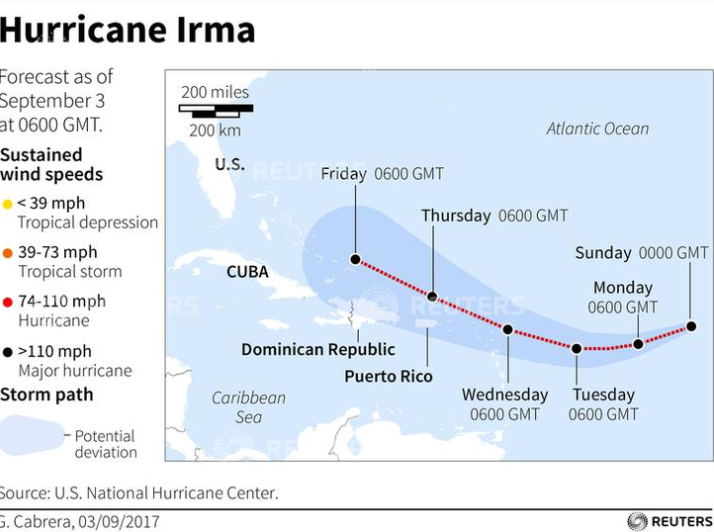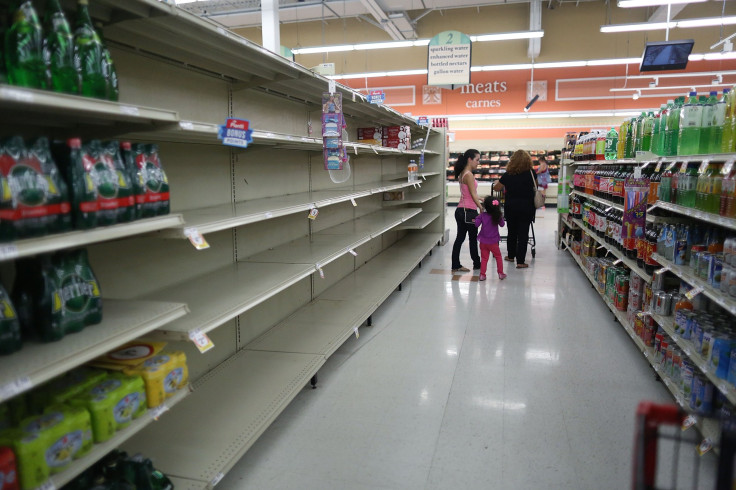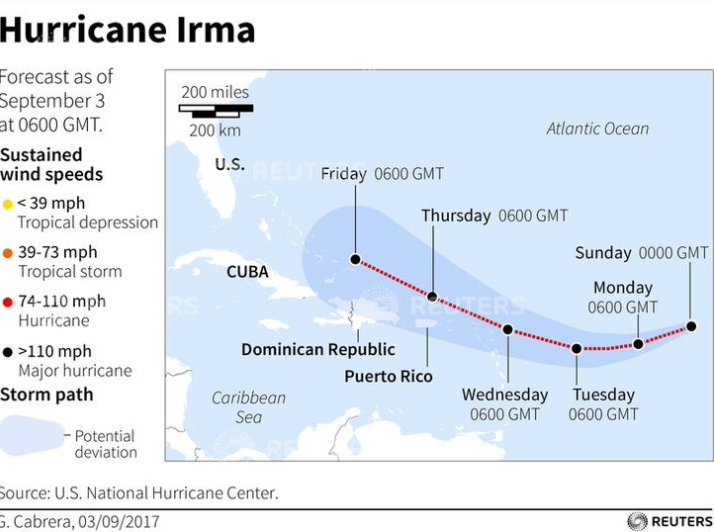Where Is Hurricane Irma Going And When Will It Hit?

UPDATE: 5:35 p.m. EDT – Hurricane Irma continued on its warpath Wednesday afternoon, making a beeline for South Florida. The storm appeared as though it was on track to hit South Florida’s east coast, according to the latest assessment.
The hurricane was expected to continue moving north-northwest for the next two to three days, the National Hurricane Center said in an update. Upon approaching the southern tip of the state and the Florida Keys, the storm would likely turn north.
“South Florida and Central Florida will be impacted,” said Hurricane Center spokesman Dennis Feltgen, according to the Miami Herald. “We’re confident with that right now. What we’re not confident with is exactly where that center is going to go. But remember a hurricane is not a dot on the map. They’re large storms that cover a large area.”
9/6 2pm: Latest estimates of when tropical-storm-force winds could arrive & are most likely to arrive with #Irma https://t.co/tW4KeGdBFb pic.twitter.com/IrntA1wIBD
— National Hurricane Center (@NHC_Atlantic) September 6, 2017
UPDATE: 9:38 a.m. EDT – Hurricane Irma hit the Caribbean island of Barbuda as a Category 5 storm early Wednesday morning with winds of up to 185 mph. The storm then moved on to St. Martin, St. Barts, Anguilla, and St. Kitts and Nevis and was expected to pass near the British Virgin Islands and the northern U.S. Virgin Islands before moving on toward Puerto Rico Wednesday afternoon. The National Weather Service said it expected the storm to bring "life threatening wind, storm surges and rainfall" to portions of Puerto Rico Wednesday.
Irma was expected to head toward Turks and Caicos and the southeastern Bahamas, according to CNN. It remained unclear whether it would make landfall in Florida – the Key West area issued a mandatory evacuation order for residents in preparation.
#Irma is a potentially catastrophic hurricane and will bring life-threatening wind, storm surge, & rainfall to portions of Puerto Rico today pic.twitter.com/ZcBstQu1ig
— National Weather Service (@NWS) September 6, 2017
Original story:
As the nation reels from the devastation of Hurricane Harvey, some of the country is preparing for another potentially catastrophic storm. Hurricane Irma, a Category 5 storm as of Tuesday afternoon, was making its way through the Caribbean, possibly bound for parts of the United States.
The hurricane approached Caribbean islands Tuesday, including the British and U.S. Virgin Islands, Puerto Rico, Antigua and Barbuda, and the Leeward Islands. Irma was already armed with the most powerful winds recorded in an Atlantic Ocean storm at the time with speeds of up to 185 mph, the Associated Press reported.
The storm would be near or over Antigua and Barbuda, St. Kitts and Nevis and Anguilla by late Tuesday or early Wednesday, while it would likely hit the British and U.S. Virgin Islands and Puerto Rico Wednesday, according to CNN. Irma could pass close to or over the Dominican Republic, Haiti and Turks and Caicos Thursday or Friday and hit Cuba Friday and Saturday.
It remained unclear whether Irma would hit the U.S. mainland directly, but the storm has a number of paths it could travel if it makes landfall in the U.S, according to AccuWeather. The storm could hit land in Florida, Georgia or the Carolinas, depending on the path it paves over the next few days.

“This hurricane has the potential to be a major event for the East Coast,” said Evan Myers, AccuWeather expert senior meteorologist and chief operating officer. “Hurricane Irma’s impacts on the U.S. mainland may start to be felt at the end of the week, but it is not too early to start to make preparations.”
AccuWeather pinned the most likely possibility as hitting South Florida and the Florida Keys. Those particular areas would see rain and wind hit Saturday and Sunday. Should the hurricane move toward the Panhandle, it could hit the region early next week, according to Accuweather.
Florida’s Miami-Dade County Mayor Carlos Gimenez announced special-needs residents would start evacuating Wednesday, while other evacuations might follow. Officials in the Florida Keys announced visitors to the islands would have to evacuate by sunrise Wednesday and said they would likely order residents to evacuate soon after.
“We do not know the exact path of this storm,” Florida Gov. Rick Scott said Tuesday. “But weather can change in an instant and while we hope for the best, we must prepare for the worst.”

© Copyright IBTimes 2024. All rights reserved.





















